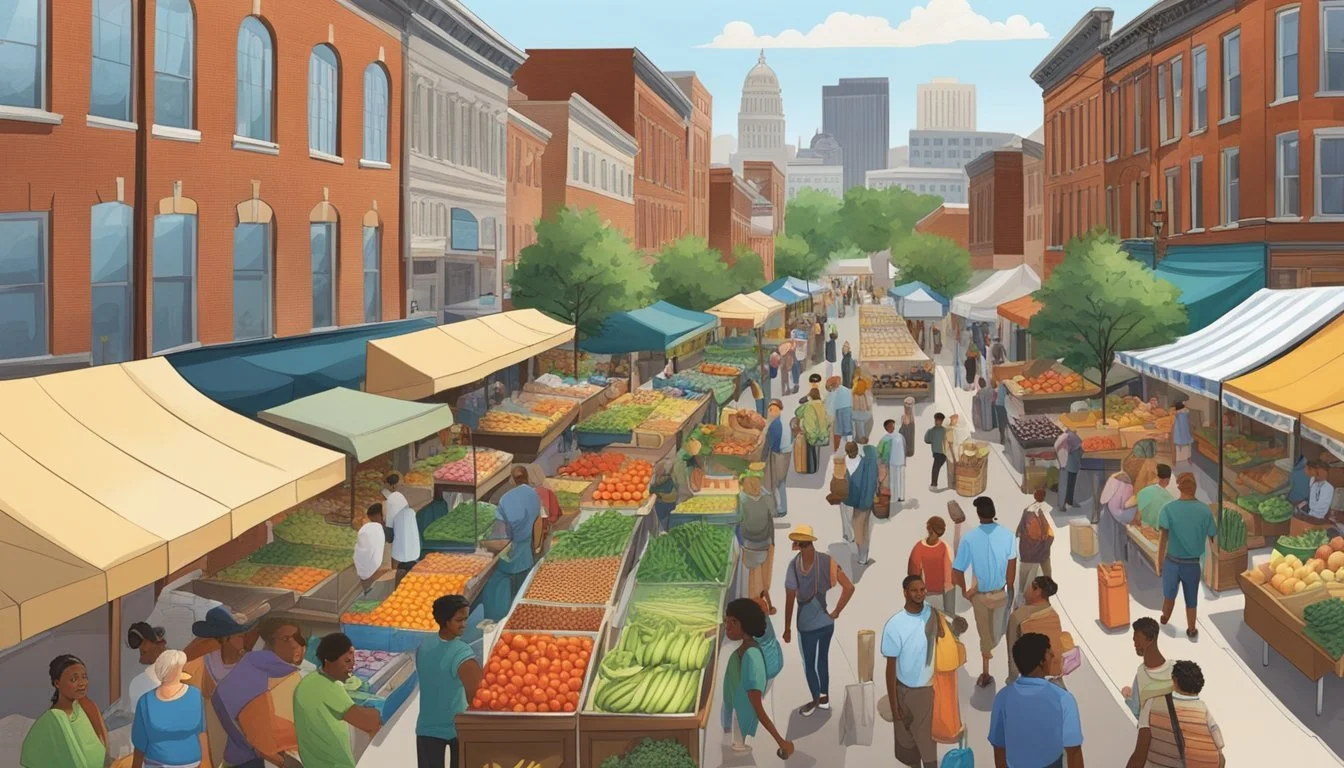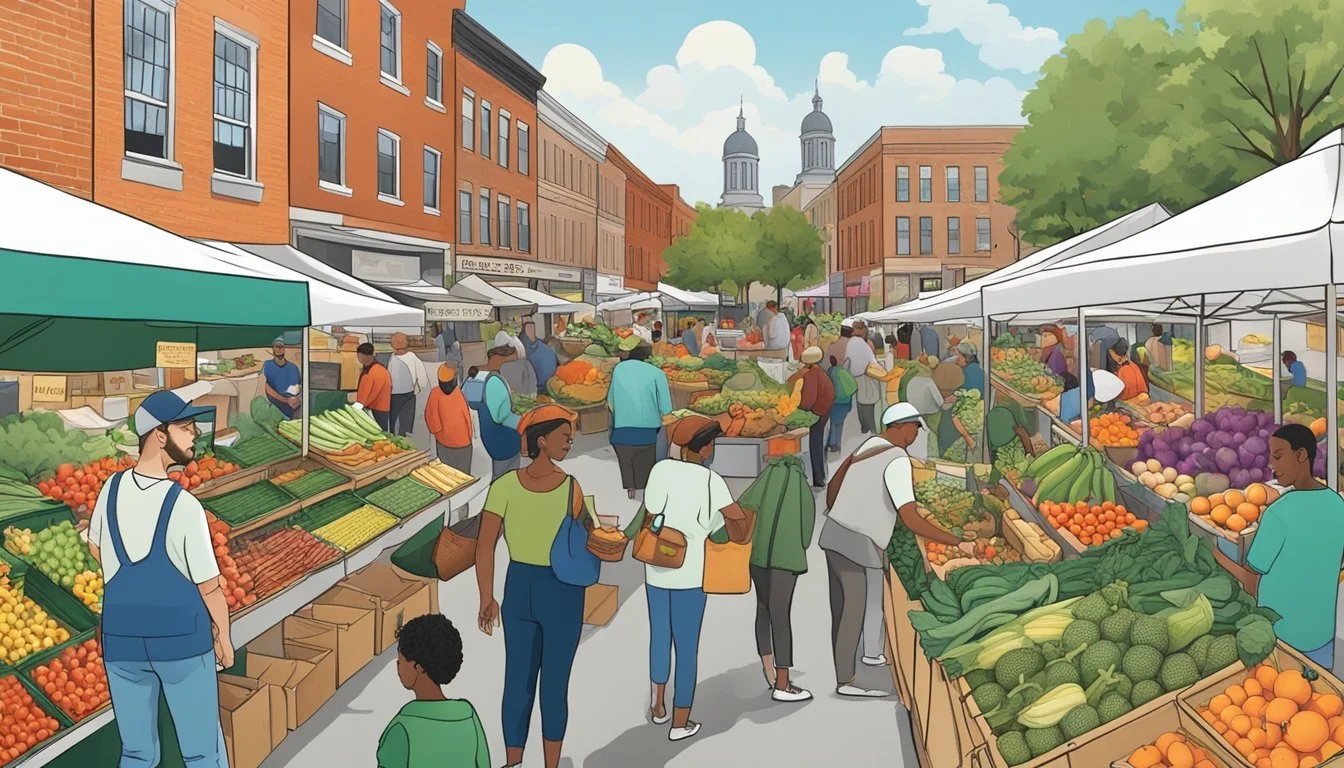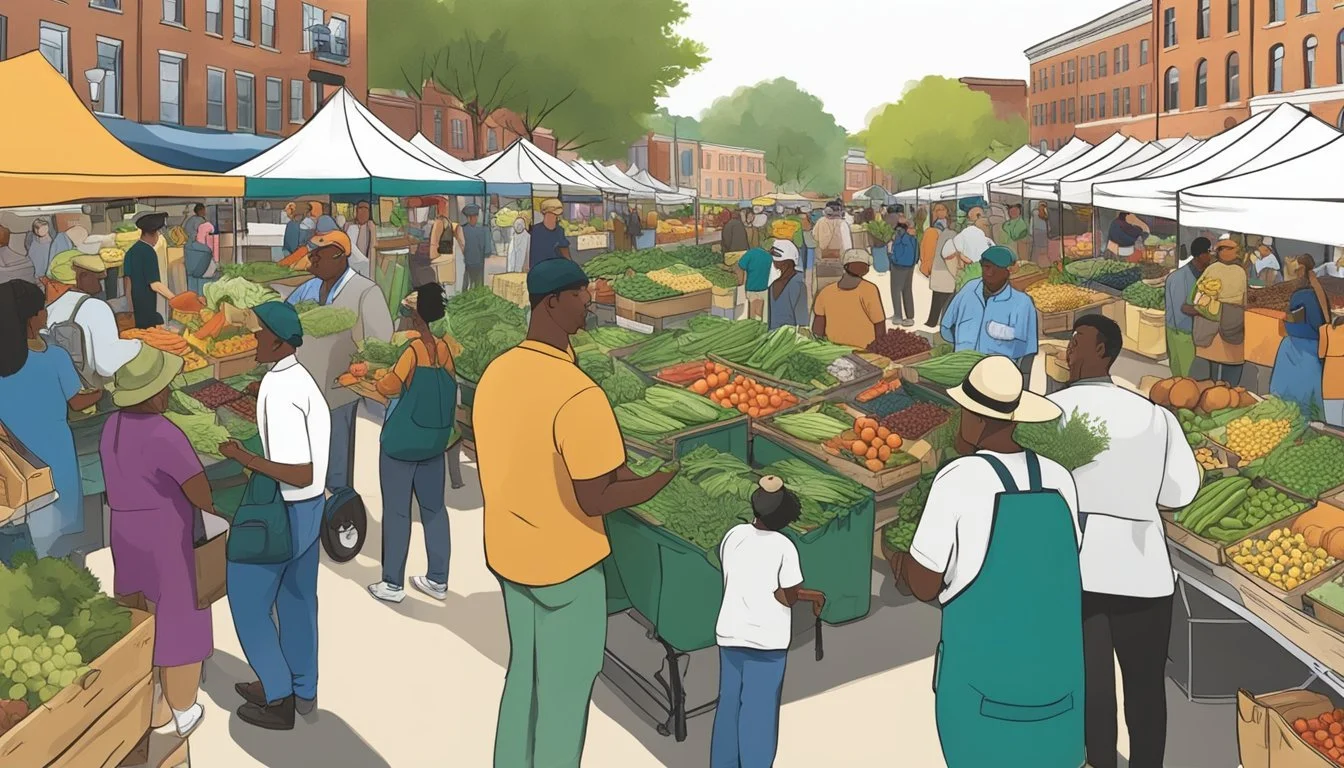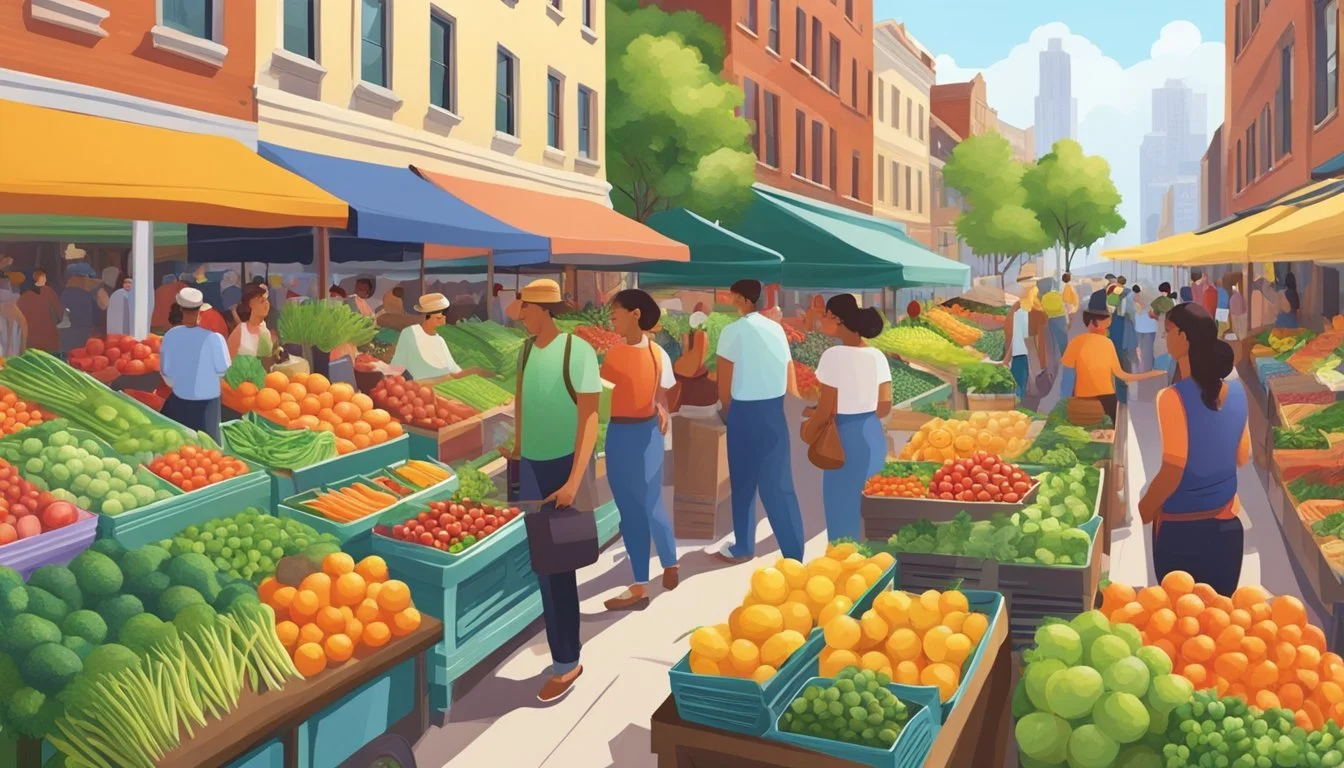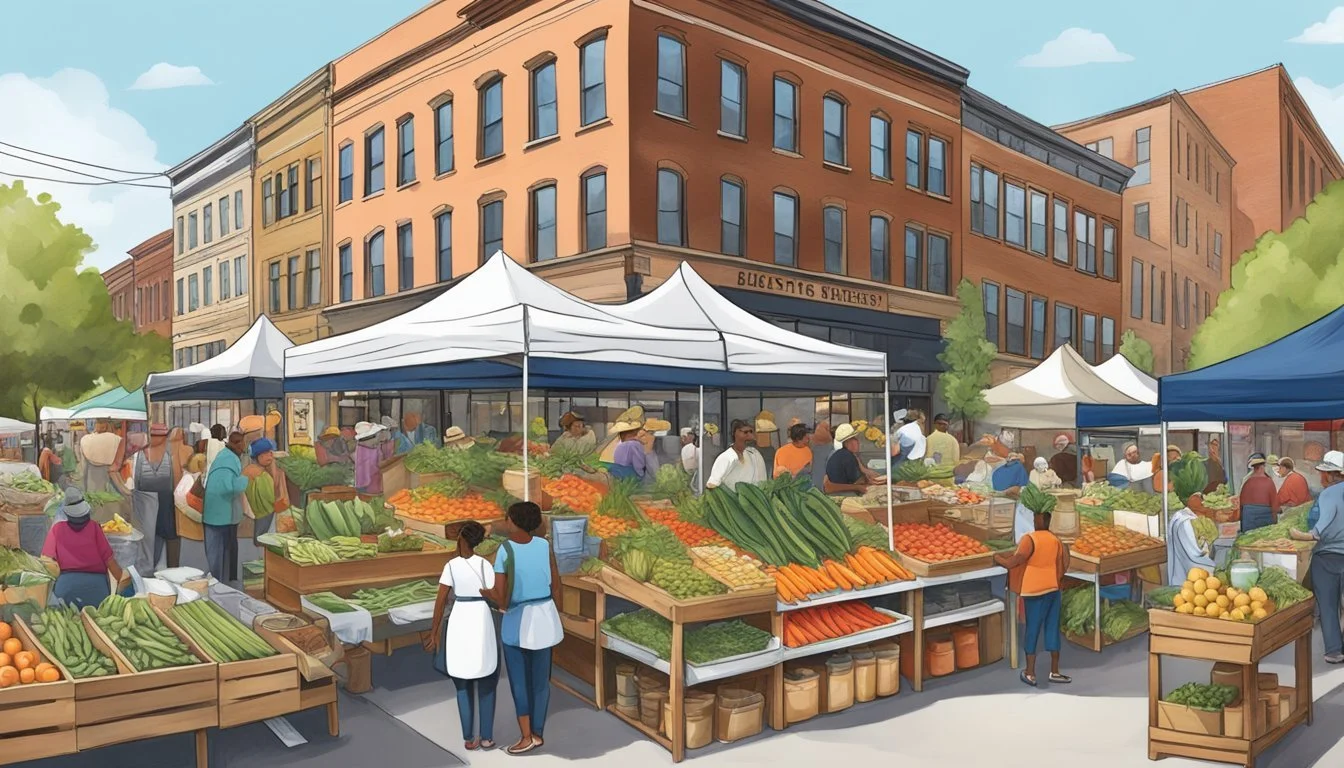Community Supported Agriculture (CSA) in Baltimore, MD
A Guide to Local Farm Subscriptions
Community Supported Agriculture, widely known as CSA, has taken root in Baltimore, offering residents of the city and surrounding Maryland areas a model of food procurement that is directly connected to local farming operations. By subscribing to CSA programs, individuals and families pledge support to a specific farm or group of farms, enabling them to receive regular shares of fresh, locally grown produce, and sometimes additional farm products like meat and dairy. This system fosters a relationship between consumers and producers, built on mutual commitment and the shared benefits of high-quality, seasonal food.
In Baltimore, the CSA model has not only provided a platform for fresh produce but also encouraged the growth of sustainable farming practices. The subscription-based approach secures a market for farmers, allowing them to plan and fund their operations early in the season. This is especially advantageous for small-scale producers who might otherwise struggle with the volatility of the open market. Consumers in return, gain access to nutritious, farm-fresh goods, typically collected on a weekly basis throughout the farm's growing season, which in this region often spans approximately 20 weeks.
Moreover, certain CSA initiatives in Baltimore have been established with community welfare in mind, sometimes offering subsidized shares to low-income families or integrating social programs. These efforts not only provide local, healthy food to a diverse demographic but also stress the importance of agriculture education and food security within urban environments. Such community-oriented projects underline the growing awareness and responsibility towards sustainable food systems in Maryland, reflecting an evolving ethos encompassing health, economy, and the environment.
Understanding CSA
This section provides an understanding of CSA, detailing how it connects consumers with fresh, local produce, and outlines the model's role within the United States, its seasonality, and operational basics.
Community Supported Agriculture Explained
Community Supported Agriculture (CSA) is a model that directly connects farmers and consumers. Consumers purchase subscriptions from local farms, in essence becoming stakeholders. This subscription entitles them to a weekly or biweekly share of the farm's harvest, often comprising a variety of vegetables, fruits, and sometimes other products like meat or dairy.
Benefits of CSA
The benefits of engaging in a CSA are manifold. Consumers enjoy fresh, local, and healthy food, often at a lower cost than what premium organic produce commands at retail prices. Farmers benefit from a predictable income stream and a direct connection to their community. This model also promotes more sustainable food practices by reducing transportation and encouraging environmentally friendly farming.
CSA in the United States
In the United States, the CSA model has grown in popularity as more consumers seek sustainable and healthy food sources. Farms across the nation now offer CSA programs, with variations in size, scope, and the type of goods provided. Some offer additional perks, such as farm visits or participation in the harvesting process.
Seasonality and CSA Programs
CSA programs are seasonal, running mainly through the traditional growing season, which can vary by region. In Maryland, for instance, CSAs typically begin around March or April. The contents of CSA shares change as the season progresses, reflecting the variety and succession of crops ready for harvest.
How CSA Models Work
The CSA model works on a simple premise: consumers purchase a "share" of the farm's anticipated production before the start of the season. This advance payment helps cover the initial costs of the farm's production. Then, throughout the season, CSA members receive their share of freshly harvested produce either via pick-up at a designated location or through delivery, depending on the specific farm's offer.
CSA in Baltimore, MD
Community Supported Agriculture in Baltimore, MD, offers a symbiotic relationship between local consumers and producers, ensuring the availability of fresh, locally-sourced produce throughout much of the year.
Overview of Baltimore's CSA Landscape
The CSA model in Baltimore is a testament to the city's commitment to sustainable food systems and community engagement. Consumers support local farms through subscriptions, ensuring a steady demand for the seasonal produce harvested within their community.
Local CSA Farms and Programs
Real Food Farm and Calvert’s Gift Farm are notable CSA providers in the Baltimore area. They are part of a network that offers a diverse range of CSA programs, connecting consumers directly with the source of their food.
Joining a CSA in Baltimore
To join a CSA in Baltimore, consumers typically sign up at the season's start, usually by March or April. They pay in advance for a share of the season's harvest, which is then provided weekly for about 20 weeks.
Impact of CSA on Baltimore Community
The CSA system in Baltimore has fortified the connection between farmers and city residents, fostering a greater sense of community while also promoting economic stability for local producers.
CSA and Baltimore's Food Accessibility
Through membership in CSA programs, Baltimore residents have increased access to healthy and fresh food, contributing to the battle against food deserts and helping to improve food access across the city.
Baltimore's Seasonal Produce Offerings
In Baltimore's CSA programs, members can anticipate a cornucopia of produce that changes with the seasons. This ranges from vibrant greens and kale in the spring to hearty vegetables like parsnips in the cooler months, and fruits such as strawberries as they come into season.
Season Sample Produce Spring Kale, Lettuce, Strawberries Summer Tomatoes, Peppers, Melons Fall Apples, Squash, Parsnips
Consumer Engagement and CSA
In Baltimore, consumer engagement with CSA programs is pivotal for sustaining local agriculture and fostering connections between consumers and farmers. By subscribing to a CSA, community members receive a steady supply of fresh, local produce while directly supporting the agriculture community.
Choosing the Right CSA Program
Consumers in Baltimore have an array of CSA programs to choose from. They should consider factors such as pickup locations, variety of produce offered, and length of the subscription season. It is important for a consumer to select a CSA that aligns with their dietary preferences and logistical needs.
Understanding CSA Subscriptions
CSA subscriptions typically offer a weekly allotment of fresh products for a set season, which can span about 20 weeks. Upfront payments are common, securing a consumer's share for the duration. This model provides the consumer with nutritious, seasonal food and grants the farmer financial stability.
Benefits of Participating in CSA
Participation in CSA programs offers numerous benefits:
Access to healthy food and nutrition education.
Exposure to a variety of local produce, often leading to a more diverse diet.
An increase in food access within the community.
Support for sustainable food practices and local farmers.
Building Consumer-Farmer Relationships
CSAs facilitate a bond between consumers and farmers, fostering a sense of community. Consumers receive insights into the farming process, and farmers get to understand consumer needs better, which can influence crop selection. This relationship is fundamental for a CSA's success and the vitality of the local food system.
Farming and Production
The Farming and Production section focuses on the vital contributions made by farmers in the CSA model, the implementation of sustainable practices, the intricacies involved in crop selection and harvesting, as well as the various challenges CSA farming entails.
The Role of Farmers in CSA
Farmers are the backbone of the Community Supported Agriculture (CSA) system in Baltimore, forming a direct link between the production of fresh, local produce and community members. By offering subscriptions, farmers in Baltimore commit to providing a regular supply of produce, typically on a weekly basis, to those who have purchased shares in the farm's yield for the season.
Sustainable Farming Practices
Sustainable practices are at the heart of CSA farming, with many Baltimore farmers incorporating methods that foster a sustainable food system. Key practices include:
Crop Rotation: to maintain soil health and reduce pests.
Minimal Use of Pesticides: favoring natural alternatives whenever possible.
Crop Selection and Harvesting
Crop selection is a strategic decision in CSAs, with emphasis placed on offering a range of vegetables, fruits, and greens to meet members' expectations. Farmers often select crops based on factors such as seasonality, weather patterns, and soil conditions. Harvesting is timed to ensure peak freshness and nutritional value, adhering to a schedule that aligns with weekly CSA distributions.
Challenges in CSA Farming
CSA farming faces several challenges, including:
Weather Variability: Unpredictable weather can affect crop yields.
Member Expectations: Balancing crop variety with consumer preferences.
Operational Logistics: Coordinating subscriptions, harvests, and distributions.
Through the CSA model, Baltimore's farmers are not just growing crops; they are nurturing a sustainable food culture grounded in community participation and environmental stewardship.
Marketing and Growth
In the realm of Community Supported Agriculture (CSA) in Baltimore, strategic marketing efforts have been pivotal to program expansion, leveraging the increase in consumer demand for local and sustainable food sources. These strategies have also shaped the future of CSA's presence in local markets.
CSA Marketing Strategies
CSA programs in Baltimore have adopted a diverse range of marketing strategies to attract consumers. Utilizing farmers markets as platforms, they directly engage with community members, offering insights into the variety and benefits of CSA subscriptions. Regular communication through newsletters, social media platforms, and community events helps to educate potential consumers on the value of supporting local agriculture. Many farms highlight the freshness of their produce as a key selling point, often contrasting it with the less vibrant offerings found at typical grocery stores.
Direct engagement at farmers markets
Use of social media for updates and education
Emphasizing produce freshness comparison to grocery stores
Expansion of CSA Programs
CSA programs have experienced growth in Baltimore, displaying a trend towards an increase in variety and customization of subscription options. This expansion caters to the consumer's desires for different products and quantities. The University of Maryland Extension has noted that such arrangements often start with a farmer or a consumer group initiative, indicating a collaborative growth model bolstered by community interest.
Growth trend in subscription variety and customization
Collaborative models between farmers and consumers
The Future of CSA in Local Markets
The future of CSA in Baltimore’s local markets looks promising. Forecasts suggest a continued increase in consumer interest in local and sustainable food sources. CSA programs are well-positioned to meet these demands, enabling further integration into the fabric of the community. Partnerships with the Maryland Department of Agriculture and other organizations could potentially strengthen these local food systems, ensuring that CSAs remain a vital part of the city's economy.
Forecasted increase in demand for local and sustainable options
Potential for strengthened partnerships with government and organizations
Ancillary CSA Products
Ancillary products in Community Supported Agriculture (CSA) programs in Baltimore, MD encompass a range of items beyond traditional vegetable offerings. These additions cater to the increasing consumer demand for variety, incorporating local produce, meats, and other fresh food items. The inclusion of these products provides a more comprehensive food experience and supports the local farm economy.
Including Meats and Other Products
Many CSA programs in Baltimore have expanded to include meats in their offerings. This variety typically comprises beef, poultry, and pork, sourced directly from local farmers dedicated to ethical and sustainable farming practices. Members who subscribe to these CSAs not only receive their weekly vegetable shares, but also enjoy the richness of fresh, locally-raised meats.
Meat Types:
Beef
Poultry
Pork
Beyond Vegetables - Diversifying CSA Offerings
Diversification is key to the evolution of CSAs in Baltimore. Apart from vegetables and meats, CSAs now often feature an array of other products including fruits, greens, and veggies. This expansion allows consumers to enjoy the full spectrum of farm-fresh food, encouraging a well-rounded diet and introducing families to new flavors and ingredients. It's a weekly adventure in fresh, local eating.
Common Additional Offerings:
Fruits (e.g., apples, berries)
Greens (e.g., spinach, kale)
Seasonal veggies (e.g., squash, tomatoes)
The Role of Value-Added Products in CSA
CSA programs further enrich their offerings with value-added products. These can include artisanal cheeses, baked goods, or preserved items such as jams and pickles. By integrating these products, CSAs enhance the consumer experience and bolster the local food system, supporting the livelihood of local producers who excel in creating high-quality goods.
Examples of Value-Added Products:
Artisanal Cheeses
Baked Goods
Preserves (e.g., jams, pickles)

